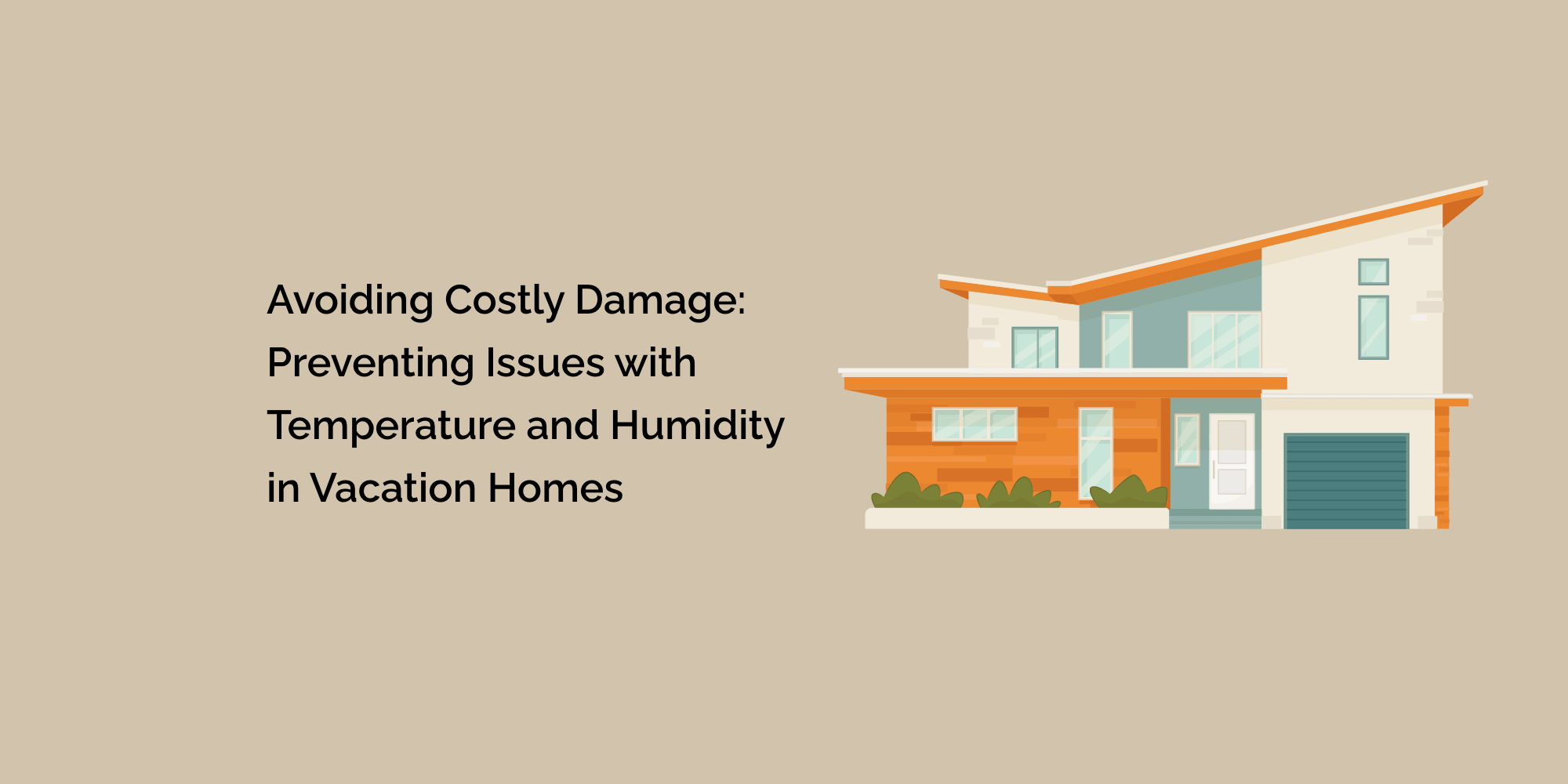Owning a vacation home is a wonderful investment that offers an escape from the hustle and bustle of everyday life. Whether it's nestled in the mountains or overlooking the ocean, your vacation home is a place of relaxation and rejuvenation. However, maintaining the ideal environment in your vacation home is essential to prevent costly damage and ensure that it remains a haven of comfort for years to come. Temperature and humidity fluctuations can lead to a range of issues, from structural damage to the growth of mold and mildew. In this blog, we will delve into the significance of temperature and humidity control in vacation homes, the potential damage that can occur without proper monitoring, and practical steps to prevent such issues and avoid unnecessary expenses.
Understanding the Importance of Climate Control in Vacation Homes:
Proper climate control is crucial for maintaining the value and condition of your vacation home:
-
Structural Integrity: Fluctuations in temperature and humidity can lead to structural issues such as warping, cracking, and deteriorating wood, plaster, and paint.
-
Valuable Possessions: Vacation homes often house valuable items like artwork, furniture, and electronics that require a controlled environment to prevent deterioration and maintain their value.
-
Guest Comfort: Providing guests with a comfortable environment enhances their experience and encourages repeat visits.
- Energy Efficiency: Efficient climate control not only prevents damage but also reduces energy consumption and lowers utility costs.
The Role of Temperature Fluctuations:
Temperature fluctuations can lead to a range of problems in vacation homes:
-
Freezing Pipes: In cold climates, freezing pipes can cause extensive damage and costly repairs.
-
Mold and Mildew Growth: High humidity levels due to inadequate ventilation and temperature control can encourage mold and mildew growth, posing health risks and damaging property.
-
Furniture and Wood Damage: Fluctuating temperatures can cause wood to expand and contract, leading to warping and splitting. Furniture can also be damaged by extremes in temperature.
- Energy Inefficiency: Drastic temperature changes cause heating and cooling systems to work harder, leading to higher energy bills.
Impact of Humidity Fluctuations:
Humidity fluctuations can have equally detrimental effects on vacation homes:
-
Mold and Mildew Growth: High humidity levels create an environment conducive to mold and mildew growth, which not only damages property but also poses health risks.
-
Wood and Furniture Damage: Excess moisture can cause wood to swell, leading to warping and weakening of structures. Upholstered furniture can develop musty odors and deteriorate.
-
Peeling Paint and Wallpaper: High humidity can cause paint and wallpaper to peel, leading to the need for costly repairs and renovations.
- Poor Indoor Air Quality: Excessive humidity can result in poor indoor air quality, affecting the health and comfort of occupants.
Preventive Measures for Temperature and Humidity Control:
To prevent issues with temperature and humidity in vacation homes, consider the following measures:
-
Proper Insulation: Ensure that your vacation home is well-insulated to regulate indoor temperatures and minimize temperature fluctuations.
-
Seal Windows and Doors: Properly sealed windows and doors prevent drafts that can lead to temperature imbalances.
-
Use Dehumidifiers: Dehumidifiers are effective in reducing excess moisture, preventing mold and mildew growth.
-
Regular Ventilation: Proper ventilation helps maintain healthy indoor air quality and prevents the buildup of excess humidity.
- Smart Climate Control: Invest in smart thermostats and humidity sensors that allow remote monitoring and adjustments.
The Benefits of Smart Climate Control:
Smart climate control offers several advantages for vacation homeowners:
-
Remote Monitoring: Stay connected to your vacation home and receive real-time data on temperature and humidity levels.
-
Timely Alerts: Smart systems send alerts and notifications if there are drastic fluctuations, enabling you to take immediate action.
-
Energy Efficiency: Smart systems help you optimize heating and cooling, reducing energy consumption and costs.
- Preventive Maintenance: Early detection of temperature and humidity issues helps you prevent potential damage, saving you money on repairs.
Choosing the Right Smart Climate Control Solutions:
When selecting smart climate control solutions, consider the following factors:
-
Compatibility: Ensure that the system is compatible with your vacation home's heating, ventilation, and cooling systems.
-
User-Friendly Interface: Choose a system with an intuitive interface for easy remote monitoring and adjustments.
-
Data Storage and Analysis: Opt for systems that offer data storage and analysis, providing insights into climate patterns over time.
- Connectivity: Look for systems that offer reliable connectivity options like Wi-Fi or cellular networks.
The Cost of Neglecting Temperature and Humidity Control:
Neglecting proper temperature and humidity control can lead to significant financial repercussions:
-
High Repair Costs: Structural damage, mold remediation, and repairs can result in substantial expenses.
-
Loss of Property Value: Untreated damage can lead to a decline in your vacation home's value.
-
Guest Dissatisfaction: Uncomfortable environments can lead to negative guest experiences and impact your property's reputation.
- Energy Waste: Inefficient heating and cooling systems result in wasted energy and higher utility bills.
Conclusion:
Maintaining a comfortable and protected environment in your vacation home is essential to preserve its value and create enjoyable experiences for you and your guests. Temperature and humidity control play a pivotal role in preventing costly damage, ensuring that your vacation home remains a haven of comfort and relaxation. By embracing smart climate control solutions and taking preventive measures, you can avoid unnecessary expenses and enjoy the benefits of a well-maintained vacation home for years to come.








